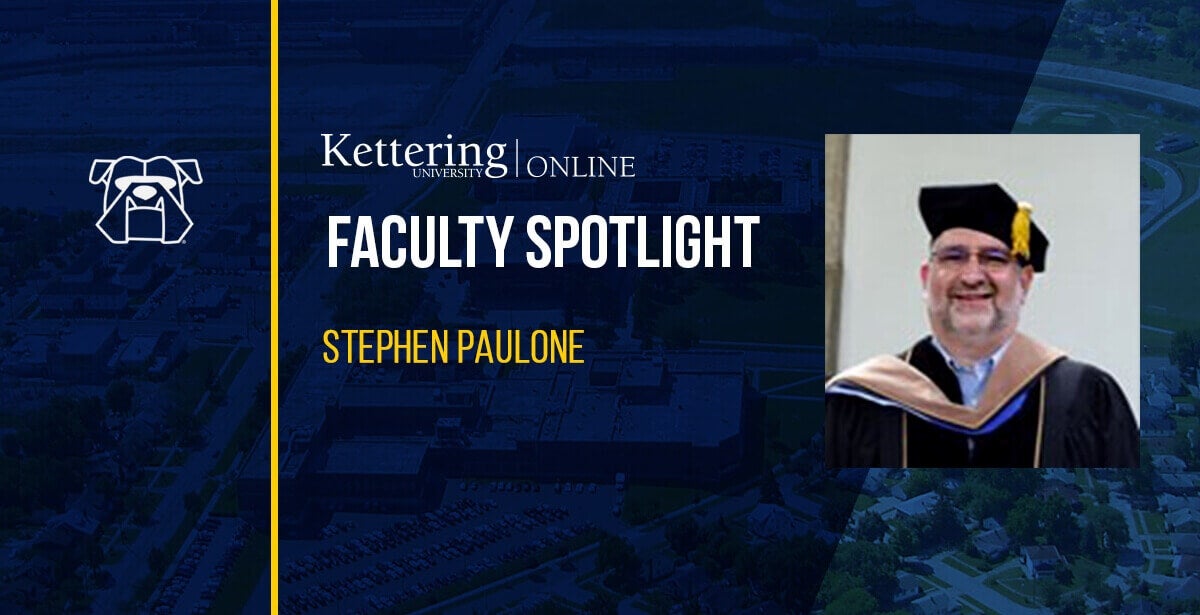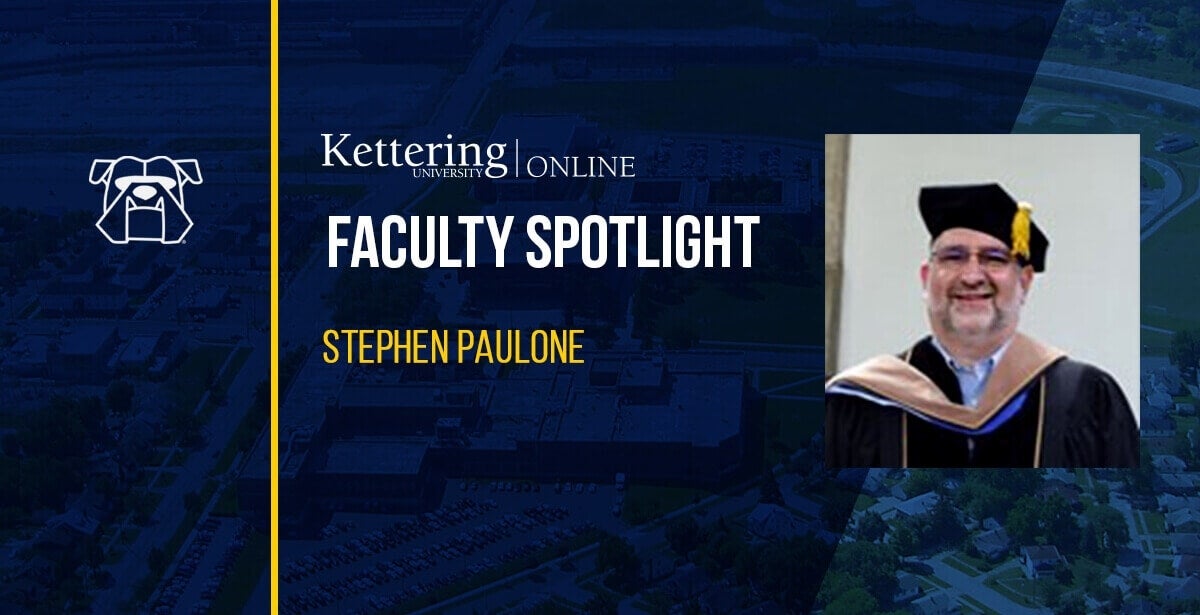
Faculty Spotlight: Dr. Stephen Paulone
As Kettering University Online’s (KUO) Program Development Manager and Senior Instructional Designer, I have the pleasure of working with our Contributing Faculty members, and Faculty Mentors, many of whom are subject matter experts for the courses they teach. Coming from a wide range of educational, career, and geographical backgrounds, KUO faculty unite in the effort to link transformative experiential education to rigorous academic standards with real-world applications for learning that lasts a lifetime.
This time, we are happy to shine the Faculty Spotlight on KUO Contributing Faculty Member, Dr. Stephen Paulone. Following are excerpts from our conversation:
JL: First, thanks so much for making the time to chat.
SP: You are welcome. I am happy to do so!
JL: Where did you grow up?
SP: I was born and raised in Waterbury, CT; onetime brass capital of the world!
JL: Which degrees do you have and from where?
SP: I have a DBA in Financial Management from Northcentral University in Prescott, AZ; An MS, Concentration in Finance and an MBA, Concentration in Marketing from Rensselaer Polytechnic Institute in Hartford, CT; and a BA in English from Fairfield University in Fairfield, CT.
JL: In brief, what is your teaching philosophy?
SP: I believe learners have a context they bring to a learning environment and goals for taking a course. My intention is to bring my experience, academic background, and context to my courses to help students reach their academic goals. I would also say that we are each learning every day because things change so quickly; no one is an expert for long and we all have areas of expertise we can share with others.
JL: Which courses do you teach for KUO?
SP: I teach BUSN 779: Capstone, FINC 619: Financial Management, MRKT 679: Marketing Management, and ACCT 639: Managerial Accounting.
JL: What has surprised you most about teaching online?
SP: I have been teaching online since 1998 when it was strictly email with dial-up modems; for all of the technological changes since then, it still comes down to the same idea: connecting with students and sharing experience.
JL: I see that you have both a marketing degree and a business degree. What are the two most important things you think engineers should know about marketing?
SP: I think it is important for engineers to understand that marketing is all about the customer - product, price, place, and promotion. Effective marketing should center on the clients’ needs and not the organizations’ needs.
JL: What would you say about your Kettering students?
SP: Kettering students are fantastic! I really can say that in all my years of teaching, and in all the schools that I have taught, the focus, willingness to learn, hard work, and professionalism of Kettering students is exceptional.
Learn More About Our Online Programs
JL: What have your Kettering students taught you?
SP: Kettering students have reminded me about my love for manufacturing, working with engineers, and the need for preciseness in any and every project we undertake.
JL: What is one thing you would like your studentsto learn from you?
SP: I would like them to learn about the importance and necessity of adding value. Adding value is about taking our research, education, and experience and reflecting on it. Adding value is also about using creativity to bring it all together and see things in a new perspective in order to have a fresh approach to solving problems.
JL: What was the most helpful piece of advice you have received from a professor or manager?
SP: The fact that success does not come from only hard work and knowledge, it also relies on getting along with people and working well with others because no one person can do it alone.
JL: Did you have a mentor? If so, can you talk a little bit about that relationship, and why it is beneficial for students and professionals alike to have a mentor?
SP: I have had mentors and have been a mentor to others. I have also had people who served as poor examples of what a mentor should be. Having a mentor is helpful because we all need someone to hold up the objective mirror for us. Further, without constructive criticism we are doomed to fail due to either over-confidence or lack of confidence. No one is perfect and we each have things on which we need to work to improve our performance and ourselves.
JL: Switching gears a bit to leadership… what do you think are the three most important qualities that effective leaders should have?
SP: Empathy tempered by defined processes; knowledge honed with experience, and respect of others regardless of their title or position.
JL: What is something that we may be surprised to learn about you?
SP: After I graduated with a degree in English, I went to work in a factory as a machinist. Then, I worked my way up in organizations to director positions in marketing and finance. I always looked for new experiences and ways to integrate experience in a variety of fields. These are things I really learned in my undergraduate experience from the Jesuits who wanted everyone to be a Renaissance person. So I have also been a dish washer, pizza maker, cook, stand-up comic, executive, entrepreneur, and a professor.
JL: When you have spare time, what do you enjoy doing?
SP: I love spending time with my children and grandchildren as well as golfing and investing; sometimes I get them mixed up and maximize my golf score as I minimize my returns but I really do enjoy them both!
JL: Are there any particular career achievements or highlights you would like to mention?
SP: Once, I worked for Mac Baldrige when he was CEO of Scovill Manufacturing. Baldrige went on to serve as Ronald Regan’s Secretary of Commerce from 1981, until his death in 1987 in a horse-riding accident. He is the namesake for the Malcolm Baldrige Quality Award which is the highest level of national recognition for performance excellence that a U.S. organization can receive. I also created the first electronic catalog for the bearing industry, created the first fully online degree in New England for marketing and finance, and published a book on Mergers and Acquisitions.
KUO honors and appreciates Dr. Paulone for his contributions and highly regarded work with students.
If you are interested in becoming a student, visit Kettering University Online for information about our graduate degree programs.

